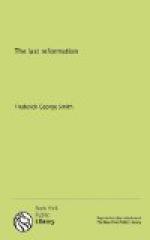Christ, the life of his spiritual body, and the life-giver, remains the same in all ages. Hence the church body is the part that has been disrupted and corrupted by apostasy and sectarianism, and is therefore the sphere of reformatory effort. And while reformation pertains to historical Christianity, it implies, as we have already shown, a return to the primitive standard. Therefore, before proceeding to describe particularly the present reformation, we must give attention to the constitution of the apostolic church, the divine original.
PART I
The Church in Apostolic Days
=The Last Reformation=
CHAPTER I
THE CHURCH DEFINED
[Sidenote: The term “church”]
The word “church” as used in the New Testament is, in most cases, derived from the Greek word ekklesia. The component parts of this word literally mean to summon or call together in public convocation. It was, therefore, used to designate any popular assembly which met for the transaction of public business. As an example of the secular use of the term, see Acts 19: 32, 39. This particular application of the word, however, does not here concern us.
Since the word ekklesia conveys the idea of an assembly of “called ones,” it expresses beautifully the Christian’s call to churchly association. The divine call of believers is frequently expressed in the New Testament: they are “called with an holy calling” (2 Tim. 1:9); “called in one body” (Col. 3:15); “called unto his kingdom and glory” (1 Thess. 2:12); or, as Peter expresses it, “Ye are a chosen generation, a royal priesthood, an holy nation, a peculiar people; that ye should show forth the praises of him who hath called you out of darkness into his marvelous light” (1 Pet. 2:9). While these texts and many others describe the exalted rights and privileges accorded the “called ones,” there is distinctly implied the idea of their organic association, and it was this association that constituted them the Christian church.
[Sidenote: Its two Christian phases]
“The church of God, which he hath purchased with his own blood” (Acts 20: 28), is Clearly set forth in the New Testament. And the term “church” in its religious usage is given two significations. In its largest and primary signification, the church of God is the entire body of regenerated persons in all times and places, and is in this respect identical with the spiritual kingdom of God, the divine family. In a secondary sense, church designates an individual assembly in which the universal church takes local and temporary form and in which the idea of the general church is concretely exhibited. Besides these two significations of the Christian term “church,” there are, properly speaking, no other in the New Testament. It is true that ekklesia is sometimes used




